Commercial real estate has been working to change from a sector notoriously lacking in diversity to one that is inclusive and representative of the tenants and communities it serves. The third edition of the Urban Land Institute’s Global Real Estate DEI Survey released in early 2024 shows that commercial real estate firms increasingly are focusing on attracting diverse people to the industry. The survey of 216 commercial real estate firms found that almost 96% had diversity, equity and inclusion policies and practices in place and 56% had enacted formal strategies. Among the U.S. firms surveyed, ULI found, 41% of full-time employees were women, and almost 30% of full-time employees are from underrepresented racial/ethnic groups. Such data suggests that change, albeit slow, is taking shape.
Personal connections play a major role in attracting talented individuals, advancing careers and building business. Here, C+CT rounds up associations and networks whose missions are to connect cohorts that are underrepresented within the commercial real estate industry.
African American Real Estate Professionals of District of Columbia
Founded: 1995
Membership/participation: Its reach is approximately 1,800, while annual membership fluctuates between 150 and 250.
Mission: to facilitate economic empowerment and parity through real estate and encourage each member to contribute to the success and growth of the Black real estate community in Washington, D.C.
Website: www.aarepdc.org
Footprint: The Washington, D.C., organization was the first, and AAREP has independent locations in Los Angeles, Dallas-Fort Worth, the San Francisco Bay Area, Philadelphia, Detroit and Atlanta.
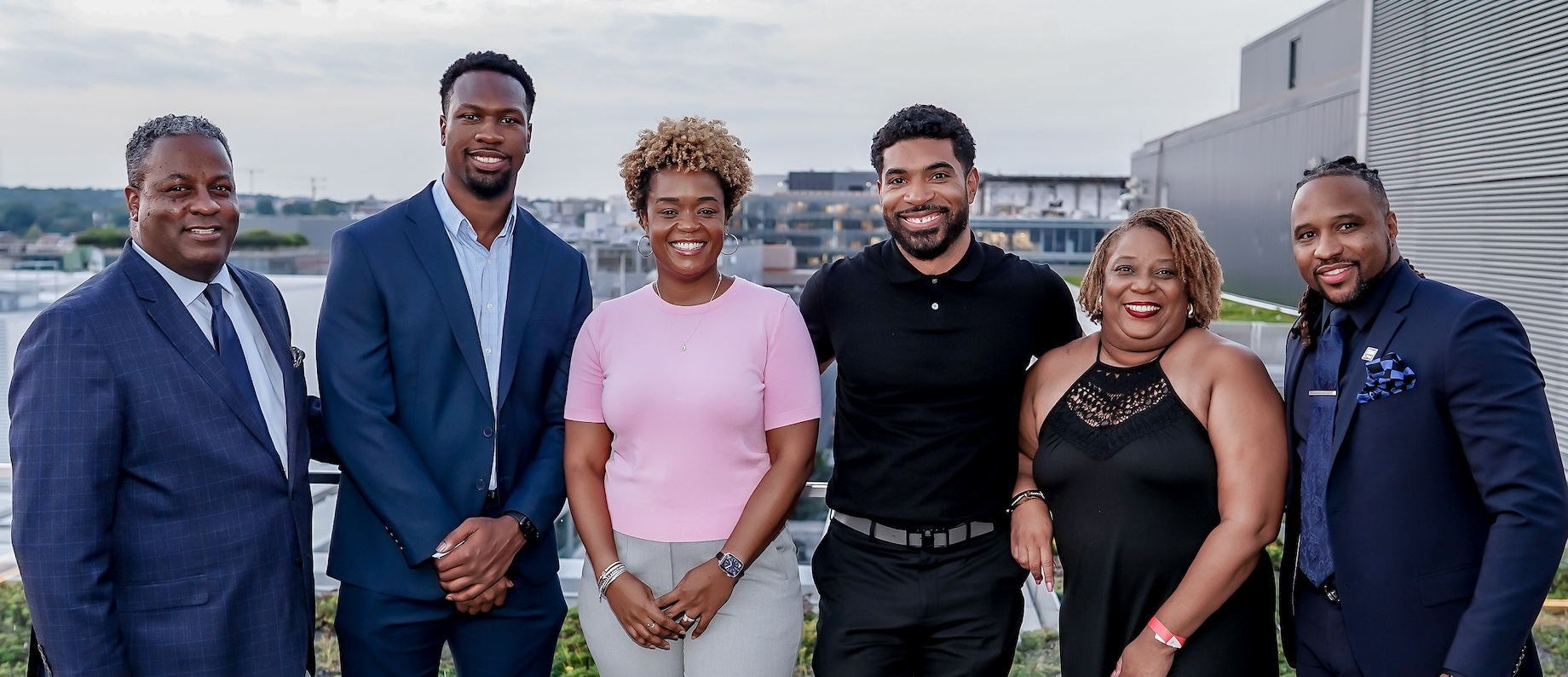
From left to right at an African American Real Estate Professionals of District of Columbia networking event on Sept. 11, 2024, are board members Derek Ford, Cory Jones Jr., Heather Wellington, Corey Powell, Natasha Thompson and Rashad Jenkins.
African American Real Estate Professionals of the District of Columbia began as a small group of dedicated professionals and has grown into a national association enhancing opportunities and returns for Black real estate professionals.
AAREP DC hosts one or two programs each month, including networking events and community service. Among its programs are an annual fundraising gala and signature educational panels, such as Access to Capital and a Contractors Forum. It also cohosts the Women of Color in Real Estate Development event with the Women of Color in Community Development organization.
“We are continuing to advance our mission by providing meaningful programming that supports the advancement of our members in the commercial real estate industry,” said Heather Wellington, AAREP DC board president. As a nonprofit, AAREP DC relies on support from corporate sponsorships and partnerships. “We cannot do the work we do without this support and hope to continue our relationships with existing partners and develop new relationships that will assist us in expanding our reach in the AAREP community,” added Wellington.
Asian Real Estate Association of America
Founded: 2003
Membership/participation: 19,000, including a subset of commercial real estate practitioners
Mission: to improve the lives of the Asian American and Pacific Islander community through homeownership
Footprint: 45 chapters in the U.S. and Canada
Website: www.areaa.org
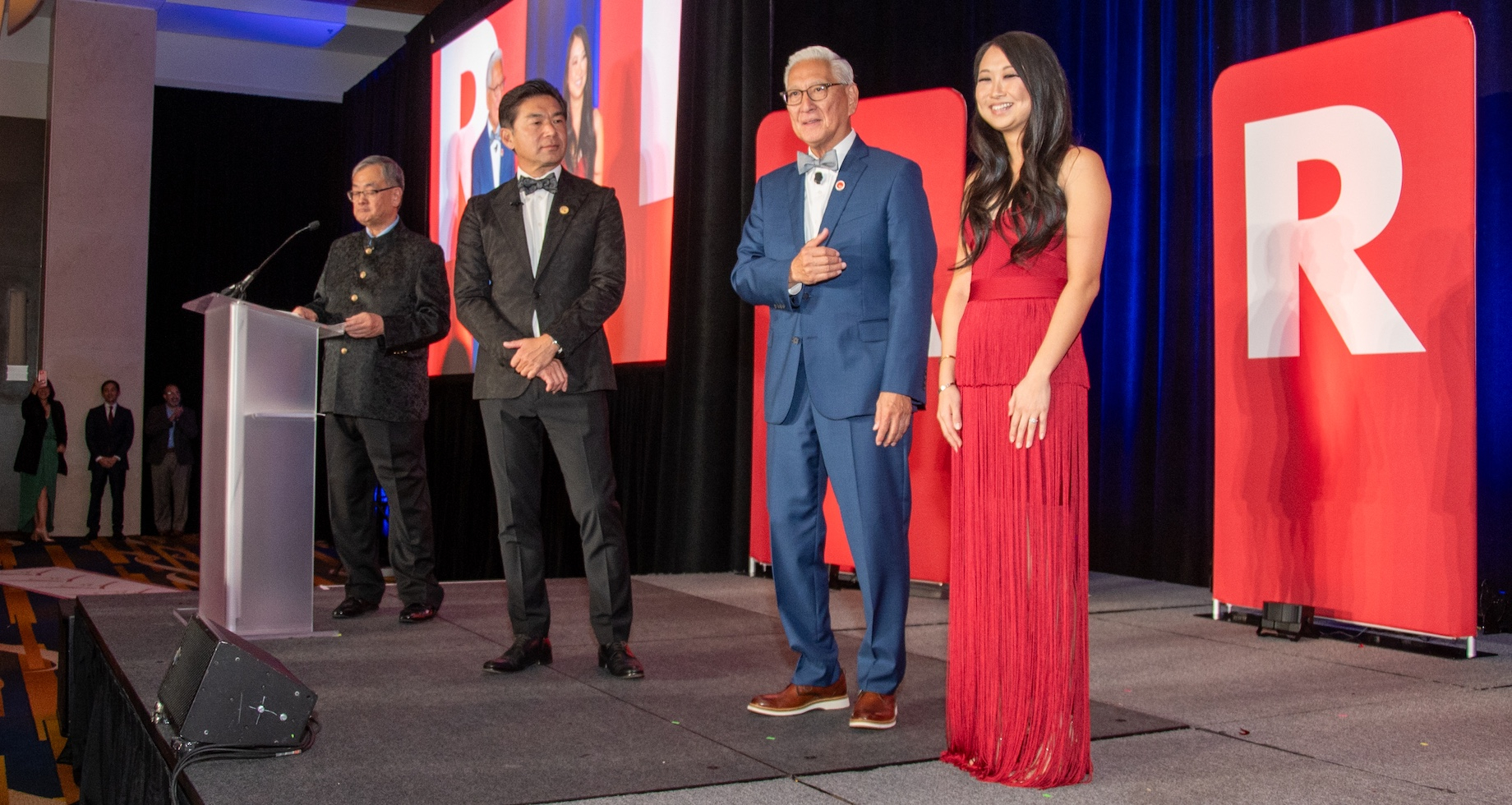
During its National Convention in Chicago in 2023, the Asian Real Estate Association of America celebrated its 20th anniversary and installed Jamie Tian, at right, as president for 2024 and 2025. Also pictured, from left to right, are AREAA founding chair and chair emeritus John Yen Wong, chair emeritus Jim Park, and founding chair and chair emeritus Allen Okamoto.
AREAA’s primary goal is advancing sustainable homeownership for the Asian American and Pacific Islander community by providing a strong national voice for housing and real estate professionals serving this market. About a decade ago, though, it also launched a commercial real estate initiative. The idea stemmed from past chair Kenneth Lee, who was also a CCIM designee. “He felt that real estate, both investment and commercial real estate, is a means to generate wealth beyond just homeownership,” said AREAA executive director and CEO Hope Atuel.
Commercial real estate is a natural extension of the focus on residential real estate, and the organization is growing its base of commercial real estate practitioners to do its part to diversify the commercial real estate industry. “The North Star of the organization is changing lives through real estate,” said Atuel. “We do that really by supporting our community, and we can’t support our community if practitioners, both residential and commercial, do not reflect the demographics.”
In the U.S., 6.4% of the population identifies as Asian American, Native Hawaiian or Pacific Islander, and that percentage is expected to double by 2040 to roughly 46 million. “We’re here to make sure that businesses are well equipped for the changing demographics of the United States, which includes greater diversity within commercial real estate,” added Atuel.
Black Commercial Real Estate Network
Founded: It was founded in 2020, and it completed its nonprofit designation in 2023.
Membership/participation: more than 1,300
Mission: to build community and accelerate success for Black professionals in commercial real estate
Footprint: national
Website: https://www.bcren.org/
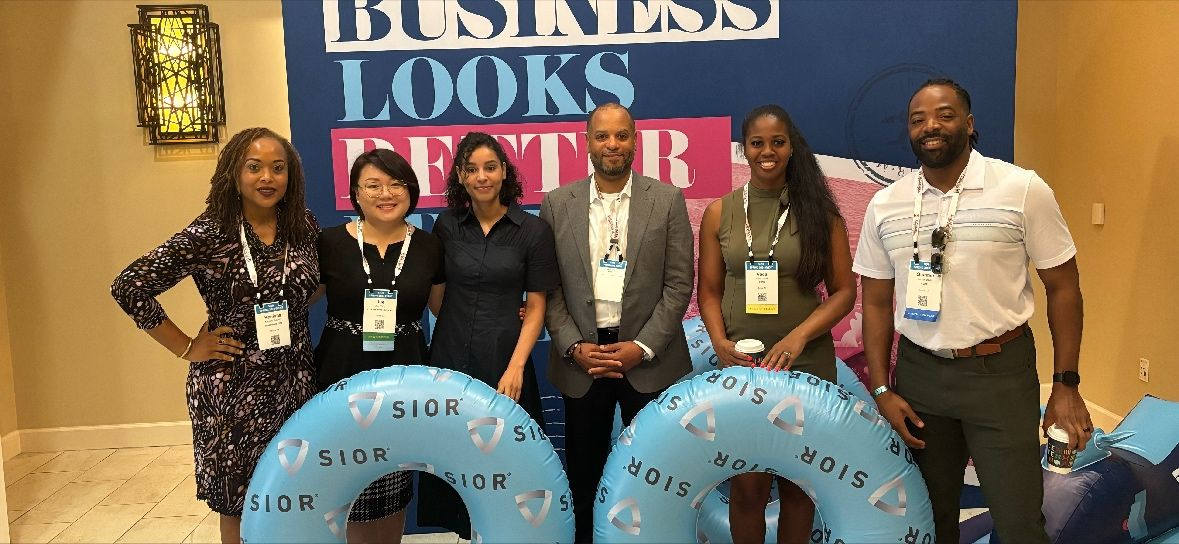
Black Commercial Real Estate Network members at a Society of Industrial and Office Realtors event.
The BCREN is a nonprofit network for Black professionals in commercial real estate that supports “a more inclusive and prosperous industry landscape.” The group focuses on career advancement, business empowerment and wealth creation for its members via skills development, resources and collaboration opportunities.
“The BCREN is committed to doing its part to ensure that CRE is an industry where we can all thrive,” said co-founder and executive director Derith Jarvis. “We are open to collaboration and nimble enough to help in a variety of ways.” BCREN’s motto — “See a need, fill a need!” — catalyzed the creation of its Young Professionals Cohort, which focuses on programming and mentoring for Black professionals new to the business.
Participants in the Young Professionals Cohort receive tools and resources on topics like business planning, prospecting, marketing, networking and industry designations. They have the opportunity to attend conferences hosted by organizations like the Society of Industrial and Office Realtors and Diversity in Commercial Real Estate with registration paid for by the BCREN. The network also helps connect young professionals with scholarship opportunities from groups like CoreNet Global and The CCIM Institute. “We have a goal to help as many as possible through this program, which will be open to more participants in 2025,” said Jarvis.
The BCREN connects at industry events, via virtual programming and in a private LinkedIn group. “As the network continues to grow, our strategy is to be as inclusive as possible by keeping the BCREN open to all Black professionals in the industry,” said Jarvis. “Because we are not limited by geography or a specific focus within the industry, we can support anyone looking for community or professional development.”
CREW Network
Founded: 1989
Membership/participation: more than 14,000
Mission: to accelerate success for all women in the global commercial real estate industry
Footprint: more than 85 major markets globally
Website: www.crewnetwork.org

From left to right: CREW Network chief member and chapter services officer Emily Reineke, CREW Orlando president Cindy Campbell, CREWBaltimore president-elect Shana Carroll, CREW Fort Worth president Dana Compton, CREW Portland (Oregon) president Samantha Jordan, CREW M (Montreal) president Julie Dubé, CREW Las Vegas president Tonya Wagle and CREW New York president Anuska Amparo.
The “CREW” in CREW Network stands for “commercial real estate women.” CREW offers leadership-development opportunities, along with business connections and networking with women across the globe. The group added six chapters in 2024, the most in its 35-year history: Memphis, Tennessee; Northwest Arkansas; Rochester, New York; Sarasota/Manatee in Florida; Mexico City; and the U.K. It also established a “presence” in Dublin.
The group intends to provide unparalleled value to its members and expand beyond North America, and it encourages executives throughout the industry to invest in women’s professional development. “Allocating resources to support women’s leadership-development and -training drives company success and substantial positive change in CRE,” said CREW chief communications officer Laura Lewis.
CREW holds in-person programming throughout the year, including the Leadership Certificate program, three Leadership Summits, the CREW Network Convention, CREW Councils and Chapter President-Elect Training. It also convenes members for networking opportunities at other industry events, including the National Multifamily Housing Council Annual Meeting, MIPIM and ICSC LAS VEGAS. In addition, CREW offers monthly virtual programs on industry topics and leadership development.
Filipinos in Institutional Real Estate
Founded: 2009
Membership/participation: more than 1,000
Mission: to educate, mentor and grow a symbiotic network of Filipinos in institutional real estate
Footprint: 10 chapters in the U.S. and the Philippines
Website: www.fiireusa.org

FIIRE’s annual dinner in downtown Los Angeles in September attracted more than 100 attendees.
Members of Filipinos in Institutional Real Estate come from a variety of disciplines, including investment sales, capital markets, asset management and property management. “The value proposition for people getting involved in FIIRE is that we’re rooted in institutional real estate but it’s the commonality of our ethnic background that brings us together,” said board president Jennifer Taylor. “FIIRE gives us the opportunity to be very intentional about pursuing this career in institutional real estate by finding mentors from Filipino backgrounds and by getting involved in networking events, and our ultimate goal is finding ways to do business together.”
“The value proposition for people getting involved in FIIRE is that we’re rooted in institutional real estate but it’s the commonality of our ethnic background that brings us together.”
The organization’s main strategy for growth is outreach to other professionals and to students who are not familiar with the industry. The new FIIRE Outreach Program spreads awareness among UCLA students via collegiate fairs and expos. The program also hopes to create opportunities for student internships and externships in the future.
FIIRE recently gained an international presence, launching its inaugural Manila, Philippines, event in 2023. Individual chapters organize their own networking and educational events, and the group hosts an annual dinner for all members. FIIRE’s next big conference will occur in the Philippines March 17 through 24.
Gay Real Estate Groups
Founded: 1980s
Mission: to foster a diverse and inclusive environment that celebrates a rich tapestry of backgrounds and work experiences for the LGBTQ+ community across the commercial real estate industry
Footprint: national
Contact: bgregroup@gmail.com
Since the 1980s, Gay Real Estate Groups, or GREG, around the country have helped LGBTQ+ individuals in commercial real estate socialize and network in commercial real estate and do so in a safe space. Many of these groups remain low profile but are important resources for the LGBTQ+ community.
The Pipeline
Founded: 2016
Membership/participation: more than 300
Mission: to provide opportunities for women to network and support one another
Footprint: national representation, with in-person events in seven regions: Philadelphia/South Jersey; Central New Jersey; North Jersey; New York City; D.C., Maryland, Virginia; Colorado; and Boston. Dallas will launch in 2025.
Website: www.pipelineladies.com

A Pipeline event in New York City that coincided with ICSC NEW YORK in December 2023
The Pipeline is aptly named for its dual goals of building a pipeline of women in retail real estate and building pipelines of business opportunities. Julie Fox and Cortney Rickle founded the group in September 2016 after a Women’s Special Interest Group at an ICSC conference. The group consists of women from different specialties, including landlords, retailers, engineers, architects and lenders.
“We’re relationship based first before transactional, meaning we very much pride ourselves on the fact that when you join the network, your first focus is on building a relationship with the women in the group,” said Fox. “You’re not immediately thinking about ‘How can I get business’ or ‘Here’s my business card.’” At the same time, real estate is a relationship-driven business, she added, “so naturally, as women get to know each other and build relationships, not only do they become friends, but yes, business does result.”
“Naturally, as women get to know each other and build relationships, not only do they become friends, but yes, business does result.”
In addition to its Landlord Leasing group, The Pipeline recently launched a Retailer subgroup that has 40 to 50 participants. And the Investment Club has grown from 10 to 30 participants over the past two years. It meets virtually on a monthly basis to discuss investment topics and potential deals.
In-person events are held in the group’s seven regions, typically on a quarterly basis. Monthly virtual lunch-and-learns also keep members connected. For the September 2024 event, ShopCore Properties COO Lauren Holden shared her journey in getting to the C-suite. The Pipeline also hosts signature events each year during ICSC LAS VEGAS in May and ICSC NEW YORK in December, with registration now open to the general public.
Project REAP
Founded: 1997
Membership/participation: More than 2,000 individuals have participated in the REAP Academy.
Mission: to advance inclusivity and impact in the commercial real estate industry through education, mentorship and partnerships
Footprint: Washington, D.C.; Atlanta; New York City; Chicago; Los Angeles; Cleveland; Columbus, Ohio; Dallas; and Kansas City
Website: www.projectreap.org
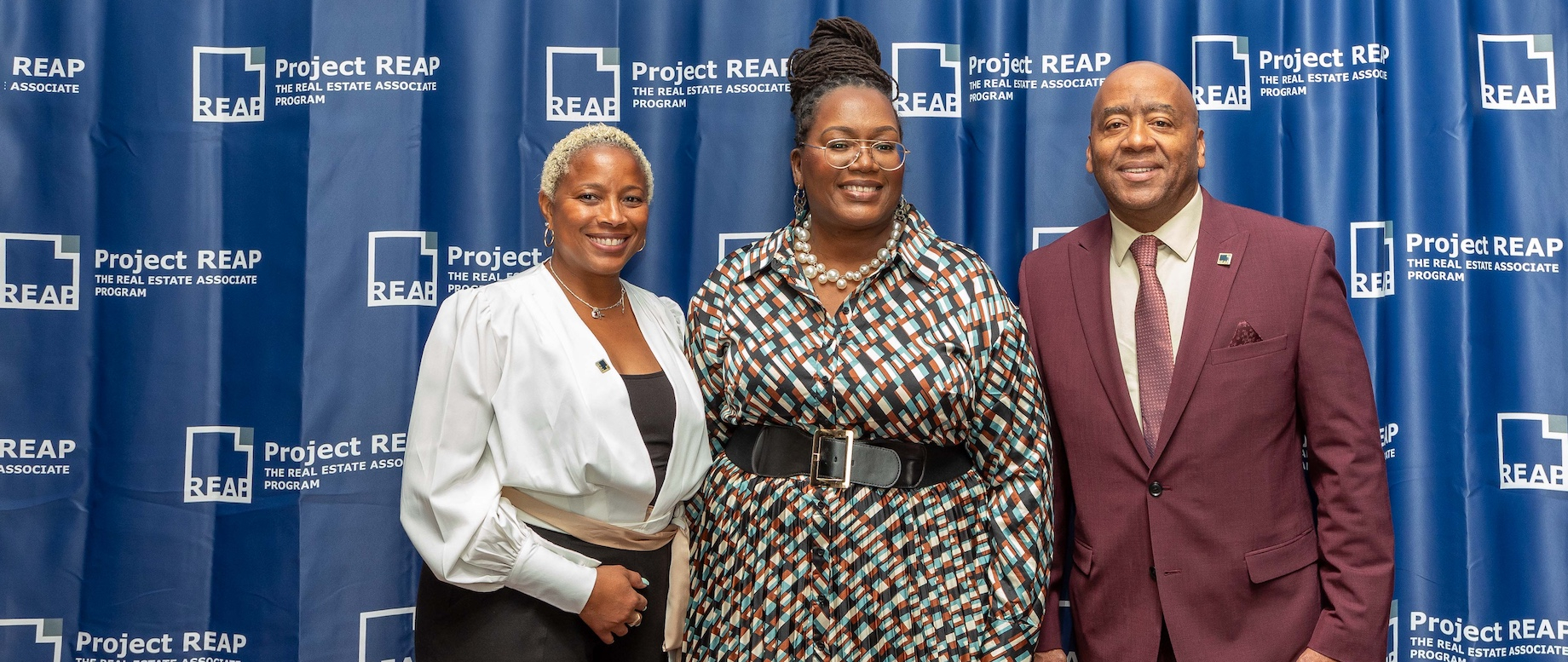
At Project REAP’s DC Silver Jubilee at Washington, D.C.’s Skyline 609 on Oct. 16, 2024, event co-chairs Janisha Richardson, who is a 2019 REAP Academy graduate, and Damian Bond, who is a 2005 graduate, flank executive director Taneshia Nash Laird. Photo credit: Louis Gilbert Photography
Project REAP, or Real Estate Associate Program, began in Washington, D.C., to tackle the low representation of professionals of color in management within commercial real estate. The program operates through REAP Academy, which offers education and training to participants, known as Fellows. Upon completion, the Fellows become Alumni Fellows, who leverage their education, mentorship and expanded professional networks to advance into leadership positions across the industry.
More than 2,000 professionals have participated in the flagship REAP Academy, which in 2023 published an impact study, Project REAP: Diversifying CRE’s Talent Pipeline for 25 Years, to measure the program’s effectiveness.
Project REAP focuses on enrolling new cohorts of Fellows into REAP Academy, offering advanced learning to Alumni Fellows and encouraging peer networking. It also encourages Alumni Fellows to act as its ambassadors, including by mentoring new Fellows and by participating in programs like REAP Speak, a speakers bureau that promotes Alumni Fellows as industry thought leaders. ICSC contributes to Project REAP and has a seat on the organization’s board.
“We envision a future where the commercial real estate industry truly reflects the diversity of the communities in which we work, live and play, with leaders of color playing pivotal roles in shaping its direction,” said executive director Taneshia Nash Laird. “This vision drives our initiatives and strategic expansions.” Project REAP plans to launch a Boston cohort next year and has plans to expand to the U.K.
Real Estate Executive Council
Founded: 2003
Membership/participation: more than 250
Mission: to build a strong community among executives of color in commercial real estate; to create connectivity for that community to the larger commercial real estate community, to financial opportunity and wealth creation and to personal and professional growth by executing programs to create leverage for its members; and to promote diversity, equity and inclusion throughout the commercial real estate industry
Footprint: national
Website: www.reec.org
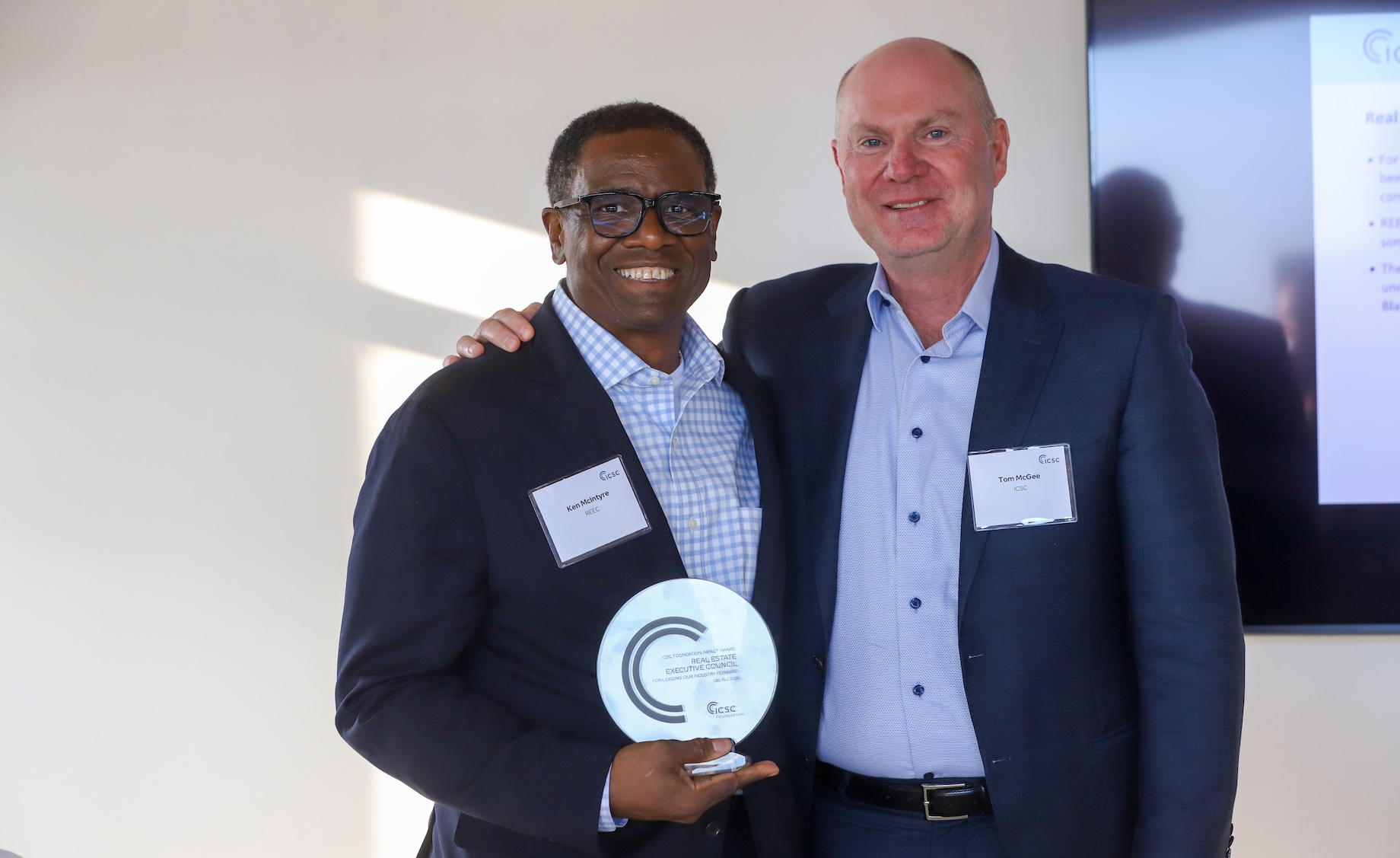
At the ICSC Congressional Black Caucus Retail Real Estate Reception in September in Washington, D.C., ICSC honored the Real Estate Executive Council and its CEO, Ken McIntyre with one of ICSC’s inaugural Impact Awards in recognition of REEC and McIntyre’s significant role in advancing diversity in the Marketplaces Industry. Pictured at the reception are McIntyre, at left, and ICSC president and CEO Tom McGee.
REEC, or Real Estate Executive Council, is a nonprofit trade association for Black and Latinx professionals in U.S. commercial real estate. It both serves its members and creates a pipeline for Black and Latinx people to enter the commercial real estate industry. “It’s about expanding the pool of talent for the industry to draw from,” said CEO Ken McIntyre. “We’re focused on providing opportunity to those who did not have a pathway to these opportunities previously.”
Among other REEC initiatives, its members visit high schools to talk to students about career opportunities in commercial real estate. REEC expects to reach 1,000 students this year and hopes to reach 2,000 next year. Via its Real Estate Exchange program, high school students spend two weeks on a college campus learning about commercial real estate in a more intensive educational format. REEC has partnered with schools like Massachusetts Institute of Technology, New York University, Harvard University and Howard University. Additional programs include internships and mentoring programs that focus on professional development for emerging leaders. “Our members do feel the responsibility to be representatives to the next generation of what they can be,” said McIntyre. “If you see it, you feel that maybe you can be it.
REEC hosts an annual conference and regional events throughout the year. It also holds in-person networking events alongside industry conferences like those hosted by ICSC, the Urban Land Institute and the National Multifamily Housing Council.
Real Estate Pride Council
Founded: 2019
Membership/participation: more than 500
Mission: to advocate for LGBTQ+ visibility and representation in commercial real estate and the professions of the built environment, to support the advancement of LGBTQ+ professionals at every stage of their careers and to serve as an educational and policy resource for the industry
Footprint: national
Website: www.pridecouncil.org
The Real Estate Pride Council is the association of LGBTQ+ professionals in the global commercial real estate industry. Its board includes leaders from fields like finance and investment, asset management, construction and development, architecture and design, law, government and academia.
Sam Chandan, director of the Chao-Hon Chen Institute for Global Real Estate Finance at the New York University Stern School of Business, founded the Real Estate Pride Council to connect LGBTQ+ students with LGBTQ+ professionals in the commercial real estate industry. Since the first meeting of about 25 people, the group has grown exponentially. Its flagship event is an annual conference in New York City held in collaboration with Deutsche Bank. The Real Estate Pride Council also hosts smaller networking gatherings throughout the year, such as Pride After Work, for which a host company typically chooses a timely industry topic.
“Some of the most important work we do is a little bit less visible, which is that we support companies and affinity groups with developing their own programming and content,” said Chandan. The Real Estate Pride Council also has a research component. For example, the group is doing a case study on LGBTQ+-affirming seniors housing, which it will share with lenders and others in the industry to help them underwrite demand and occupancy for this type of seniors housing. “The goal is to have a positive impact in an area where we think it is need,” Chandan said.
By Beth Mattson-Teig
Contributor, Commerce + Communities Today